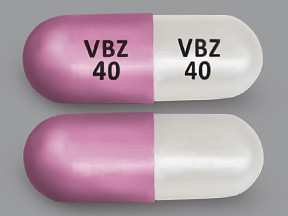VALBENAZINE - ORAL
PHONETIC PRONUNCIATION: (val-BEN-a-zeen)
COMMON BRAND NAME(S): Ingrezza
GENERIC NAME(S): valbenazine tosylate
Uses
USES: Valbenazine is used to treat involuntary movements of the face, tongue, or other body parts (tardive dyskinesia). This medication is thought to work by decreasing the amount of certain natural substances in the brain that affect how your nerves and muscles work (monoamines such as dopamine, serotonin, and norepinephrine).
How to use VALBENAZINE - ORAL
HOW TO USE: Read the Patient Information Leaflet if available from your pharmacist before you start using valbenazine and each time you get a refill. If you have any questions, ask your doctor or pharmacist. Take this medication by mouth with or without food as directed by your doctor, usually once daily. To reduce your risk of side effects, your doctor may direct you to start this medication at a low dose and gradually increase your dose. Follow your doctor's instructions carefully. The dosage is based on your medical condition, response to treatment, and other medications you may be taking. Be sure to tell your doctor and pharmacist about all the products you use (including prescription drugs, nonprescription drugs, and herbal products). Take this medication regularly to get the most benefit from it. To help you remember, take it at the same time each day. Tell your doctor if your condition does not get better or if it gets worse.
Side Effects
Precautions
Interactions
Overdose
Images
Reviews
Faq for VALBENAZINE - ORAL
Valbenazine is an oral medication primarily used to treat the symptoms of tardive dyskinesia, a movement disorder characterized by repetitive, uncontrollable movements of the face, tongue, or other body parts.
Valbenazine works by blocking the reuptake of a chemical called dopamine in the brain. By reducing the levels of dopamine, it helps to control the abnormal movements associated with tardive dyskinesia.
The recommended starting dose of Valbenazine is usually 40 mg once daily. The dosage may be increased to 80 mg once daily after one week if needed. However, the exact dosage should be determined by a healthcare professional based on individual needs and response.
Common side effects of Valbenazine include sleepiness, dry mouth, parkinsonism (symptoms similar to Parkinson's disease), restlessness, and altered taste sensation. It is important to discuss any side effects with a doctor.
Valbenazine may interact with certain medications, including but not limited to, strong CYP3A4 inhibitors, monoamine oxidase inhibitors (MAOIs), and certain antidepressants. It is important to inform healthcare professionals about all the medications currently being taken to avoid potential drug interactions.
The beneficial effects of Valbenazine may be noticed within a few weeks of starting the medication. However, the full effect may take up to 12 weeks or longer to be realized. It is essential to follow the prescribed dosage and continue taking the medication as instructed by a healthcare professional.
Valbenazine's use during pregnancy or breastfeeding is not recommended as there is limited data available on its safety in these situations. It is important to discuss the risks and benefits with a healthcare professional before considering the use of Valbenazine.
If a dose of Valbenazine is missed, it should be taken as soon as remembered. However, if it is close to the next scheduled dose, the missed dose should be skipped. Taking extra doses to make up for the missed dose is not recommended.
No, Valbenazine should not be abruptly discontinued without consulting a healthcare professional. Sudden discontinuation may lead to a worsening of the underlying condition. It is important to work with a doctor to carefully taper the dosage if the decision to stop Valbenazine is made.
Disclaimer
IMPORTANT: HOW TO USE THIS INFORMATION: This is a summary and does NOT have all possible information about this product. This information does not assure that this product is safe, effective, or appropriate for you. This information is not individual medical advice and does not substitute for the advice of your health care professional. Always ask your health care professional for complete information about this product and your specific health needs.


No Reviews Yet